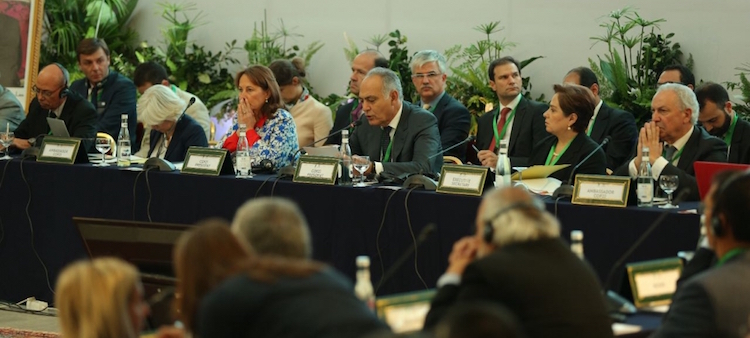
By Jaya Ramachandran
BERLIN | BONN (IDN) – OPEC, the Organization of Petroleum Exporting Countries, and the UN Framework Convention on Climate Change (UNFCCC) that are known to have been at loggerheads for nearly two decades appear to be building bridges just a few days after the Paris Agreement reached the threshold for entry into force on October 5.
In the run-up to the UN Climate Change Conference in Marrakech, Morocco from November 7 to 18, OPEC Secretary-General Mohammad Sanusi Barkindo visited Bonn to meet with UNFCCC Executive Secretary Patricia Espinosa “to enhance cooperation between the UNFCCC and OPEC and exchange views on recent developments”.
According to a joint media release, Barkindo and Espinosa, along with senior delegations from both organizations, “discussed (on October 14) the importance of enhancing cooperation between the UNFCCC and OPEC, especially on matters related to climate change, sustainable development and economic diversification”.
“The meeting builds on the ongoing involvement of OPEC in climate change negotiations and the active participation of its Member Countries,” stated the media release.
OPEC Secretary-General Barkindo congratulated UNFCCC Executive Secretary Espinosa on the entering into force of the Paris Agreement and the significant and effective support provided by the UNFCCC secretariat in this process.
“He pointed out that successful implementation of the Agreement is a priority for OPEC, adding that OPEC Member Countries have been involved in climate change negotiations and the implementation of the Convention since its inception process.”
The UNFCCC secretariat shared information regarding a high level event on sustainable economic transition and economic diversification to be organized by the Moroccan Presidency during COP22.
According to the media release, the event is expected to be attended by Ministers and heads of delegations and targets raising awareness of the importance of economic diversification and transformation in relation to the impact of the implementation of mitigation measures and how that is linked to sustainable development for many developing countries.
OPEC and UNFCCC heads apparently agreed that enhancement of cooperation between the two organizations is “beneficial, particularly since the OPEC Secretariat is an intergovernmental organization representing 14 developing countries, all of which are also Parties to the UNFCCC”. Such teamwork enhances input from developing countries in the implementation of both the Convention and the Paris Agreement, the media release stated.
The importance of inclusiveness and participation by all Parties in implementing the Paris Agreement was emphasized during the meeting, taking into account that sustainable development and poverty alleviation are high priorities for all.
“The key role of oil in economic development and the right of developing countries to develop was stressed. In this regard, the OPEC efforts towards sustainable market stability were recognized as a contribution to a healthy global economy and helping implementation of the Convention and the Paris Agreement and the transition to a low emission economy.”
Both secretariats acknowledged that economic diversification is an important objective for building economic resilience and agreed to explore all available capacities which can assist OPEC Member Countries in diversifying their economies and achieving just transition of work force.
The Paris Agreement will enter into force on November 4, 2016. As a result, the first session of the Conference of the Parties serving as the meeting of the Parties to the Paris Agreement (CMA1) will take place in Marrakech in conjunction with COP22/CMP12.
Other important consequences of the above include the transformation of Parties’ INDCs into Nationally Determined Contributions, or NDCs, which oblige governments to take action to contribute to achieving the temperature goals enshrined in the Agreement. Additionally, negotiations to develop the Paris Agreement’s implementation rule book are to be completed as soon as possible, the media release said.
With 197 Parties, UNFCCC has near universal membership and is the parent treaty of the 2015 Paris Climate Change Agreement. The main aim of the Paris Agreement is to keep a global average temperature rise this century well below 2 degrees Celsius and to drive efforts to limit the temperature increase even further to 1.5 degrees Celsius above pre-industrial levels.
The UNFCCC is also the parent treaty of the 1997 Kyoto Protocol. The ultimate objective of all agreements under the UNFCCC is to stabilize greenhouse gas concentrations in the atmosphere at a level that will prevent dangerous human interference with the climate system, in a time frame which allows ecosystems to adapt naturally and enables sustainable development.
OPEC’s mission, in accordance with its Statute, is to coordinate and unify the petroleum policies of its Member Countries and ensure the stabilization of oil markets, in order to secure an efficient, economic and regular supply of petroleum to consumers, a steady income to producers and a fair return on capital for those investing in the petroleum industry. OPEC currently comprises 14 Member Countries. [IDN-InDepthNews – 19 October 2016]
Photo: The Moroccan Presidency of the 22nd Conference of Parties to the United Nations Framework Convention on Climate Change (UNFCCC) hosted on October 18-19 the Pre-COP Ministerial Meeting in preparation for the COP22 Marrakech Climate Change Conference, November 7 to 18.
IDN is the flagship of International Press Syndicate.











